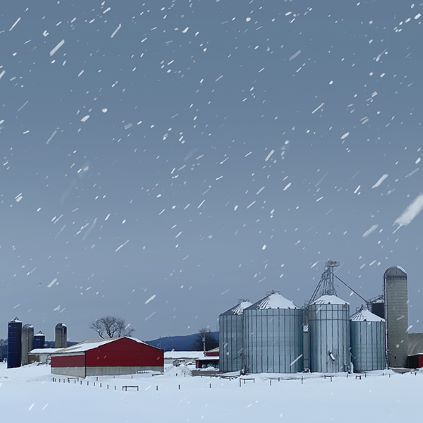Bone-chilling cold, blowing snow and paralyzing ice from a severe winter storm can impact your farm in a hurry.
Those conditions create a range of hazards to livestock, buildings, machinery and personal health and safety. You can help minimize those hazards and protect your farm by planning and taking the right action.
“The most important thing is to allow extra time to do everything,” said Nationwide Senior Consultant Erin Cumings, who also farms and raises cattle with husband Matthew in Warren County, Iowa.
Plan ahead, be attentive to changing weather and be ready to act when severe winter conditions endanger health and safety. Watch these key areas:
Personal health
Frostbite from prolonged exposure can cause the loss of limbs. If skin feels waxy or unusually firm, is red and painful or has a white or grayish-yellow color after you’ve been in freezing temperatures for an extended period, seek medical attention immediately.
To prevent frostbite, dress appropriately, layer clothing and cover all extremities. Also keep your body dry and remove wet clothing immediately. Slips and falls are common hazards in snowy or icy conditions and can be prevented by clearing and treating anywhere workers may walk. Good lighting and slip-resistant material on the ground can also help prevent falls.
Livestock
Calving beef cows below zero without protection for newborn calves can sometimes be fatal for young animals. Protect your animals and yourself in such conditions.
“We move our cows to the barn if they calve when the weather is bad, so we can keep a closer eye on them,” said Matthew Cumings. “It helps to keep a tractor or pickup nearby where you can sit when monitoring cows.”
Hogs or poultry may be inside barns, but they’re not immune to winter hazards. “If there’s a rolling power outage or lines go down, you need a backup energy source — and fast,” Erin Cumings added. “Check backup generators, so they’ll come on quickly if you need them. Preventative maintenance is important.”
Buildings
Heavy snow can cause potentially catastrophic roof collapse hazards. That's why it's important to build a roof snow management plan for your farm buildings that accounts for the snow load your buildings can withstand and notes how heavy snow will be removed.
Closing machine shed doors and windows keeps warm air inside, but restricts ventilation and increases carbon monoxide poisoning risk when machinery is running inside. If you observe symptoms — blurry vision, nausea, fatigue, headaches, dizziness and lost consciousness — call 911, shut down machinery and ventilate the area.
Machinery
Attention to machinery performance can help prevent some of the hazards, like slips and falls, that become more common when an Arctic blast hits your farm.
“We keep tractors plugged in and do everything we can to keep diesel engines from gelling up,” Matthew Cumings said. “We make sure we use diesel treatment in our trucks and tractors, keep fuel tanks full and check antifreeze often.”
If you have concerns about the hazards of severe winter weather on your farm or ranch, talk to your local Nationwide Farm Certified agent.
